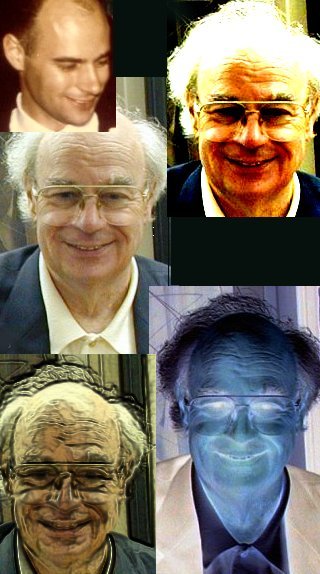Other Selves, Other Christmases
Today, we think about multiple Christmases. The University of Houston's College of Engineering presents this series about the machines that make our civilization run, and the people whose ingenuity created them.
It's been a century since Max Planck published his famous paper introducing the quantum theory. For a century we've tried to figure out what it means. Every explanation takes us further from all that common sense says about our world. We try to reject each new violation of human intuition, but quantum mechanics relentlessly passes every rational and experimental test.
We've learned that we live in an indeterminate world, that two particles can be in the same place at the same time, and that corporeal solidity is an illusion. Now Oxford physicist David Deutsch has been giving flesh and blood to the most bizarre notion of them all, and one that I find very compelling.
In 1957 Hugh Everett, a graduate student at Princeton, suggested that quantum mechanics makes sense only if there are many parallel universes. Deutsch supports Everett's idea by reminding us of an old experiment in which we shine a beam of light through thin parallel slits on to photographic film. Only every other slit of light appears on the film. If we've arranged things correctly, the alternate projected slits show up only as darkness.
Earlier quantum theorists had tried to explain this by saying that photons interact like waves and cancel one another. But that calls for a hopeless tangle of underlying assumptions. Deutsch points out that it can work only if invisible shadow photons enter from a parallel universe and obstruct the flow of light.
Bizarre as that may be, other physicists find it increasingly inescapable. Like so many other quantum ideas, this too appears to flow from logical necessity. And we can't help but notice that it's one thing to speculate about parallel universes, but here we we're asked to admit that we interact with these other worlds.
Think about the implications: Our lives are a sequence of choices: stand up or sit down, turn left or turn right, strike out or forgive. If Deutsch is right, we opt into one universe or another every time we make any free-will choice, no matter how small. There is, after all, no room for free will in a deterministic universe, a world of pure cause and effect. Any free-will decision has to be made in a place below the level of apparent cause and effect. And that's where we touch those alternate universes.
All our other selves are out there living lives better or worse than our own. That wrong turn I took, umpty-ump years ago, simply separated me from another self who took the right turn. He's out there living out that other life. Perhaps he found fame and riches only to suffer some disaster six months later.
This Christmas, I'm especially touched by this notion. For the hopes and fears of all our years truly do meet. It's an apt time to consider that every what if may've actually been played out. And, so, too, may every alternate future -- in one of the universes that you and I touch in the quiet of this winter night.
I'm John Lienhard, at the University of Houston, where we're interested in the way inventive minds work.
(Theme music)
Deutsch, D., The Fabric of Reality. New York: Penguin, 1998. (I am grateful to John Proffitt, General Manager of KUHF Radio, for providing me with an advance proof copy of Deutsch's intriguing book.
Folger, T., Quantum Shmantum. Discover, pp. 36-43, Sept. 2001. This is Deutsch's home page:
http://www.qubit.org/people/david/David.html
